常用短暂性动词与延续性动词及其例句
- 格式:doc
- 大小:22.50 KB
- 文档页数:2
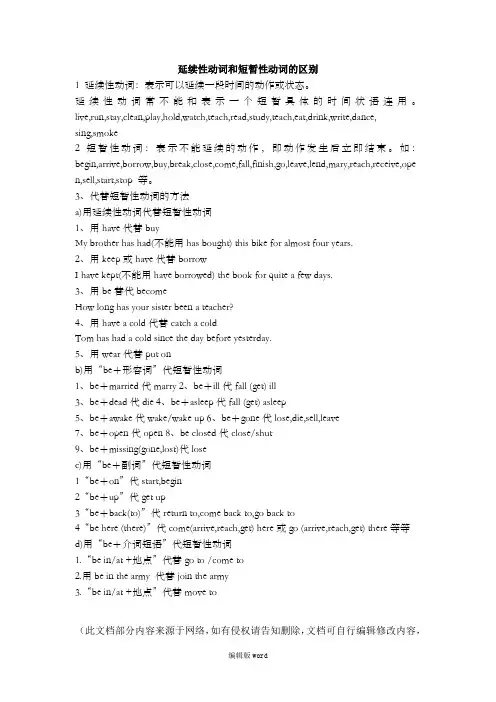
延续性动词和短暂性动词的区别1 延续性动词:表示可以延续一段时间的动作或状态。
延续性动词常不能和表示一个短暂具体的时间状语连用。
live,run,stay,clean,play,hold,watch,teach,read,study,teach,eat,drink,write,dance,sing,smoke2短暂性动词:表示不能延续的动作,即动作发生后立即结束。
如:begin,arrive,borrow,buy,break,close,come,fall,finish,go,leave,lend,mary,reach,receive,ope n,sell,start,stop 等。
3、代替短暂性动词的方法a)用延续性动词代替短暂性动词1、用have代替buyMy brother has had(不能用has bought) this bike for almost four years.2、用keep或have代替borrowI have kept(不能用have borrowed) the book for quite a few days.3、用be替代becomeHow long has your sister been a teacher?4、用have a cold代替catch a coldTom has had a cold since the day before yesterday.5、用wear代替put onb)用“be+形容词”代短暂性动词1、be+married代marry2、be+ill代fall (get) ill3、be+dead代die4、be+asleep代fall (get) asleep5、be+awake代wake/wake up6、be+gone代lose,die,sell,leave7、be+open代open 8、be closed代close/shut9、be+missing(gone,lost)代losec)用“be+副词”代短暂性动词1“be+on”代start,begin2“be+up”代get up3“be+back(to)”代return to,come back to,go back to4“be here (there)”代come(arrive,reach,get) here或go (arrive,reach,get) there等等d)用“be+介词短语”代短暂性动词1.“be in/at +地点”代替go to /come to2.用be in the army 代替join the army3.“be in/at +地点”代替move to(此文档部分内容来源于网络,如有侵权请告知删除,文档可自行编辑修改内容,供参考,感谢您的配合和支持)。

短暂动词与延续性动词1.现在完成时的构成:have / has + 动词的过去分词2.现在完成时的用法:(1)表示某一动作或状态开始于过去并持续到现在现在。
(此种用法适用于延续性动词)I have been in Nanyang for around 5 years.我在南阳大约有五年了。
(2)表示过去发生或已经完成的某一动作对现在造成的影响或结果(此种用法适用非延续性动词)。
I can’t go to see the movie now, because I have lost the ticket.现在我看不成电影了,因为我把票弄丢了。
3.现在完成时的标志:just, already, yet, ever, never, recently 近来 = in recent weeks (months, years)在最近的几周(月,年)里,nowadays, for + 一段时间,before (用于句子末尾); so far = up to now = till now; since + 过去某一具体时间点,since + 过去的一段时间 + ago, since + 一般过去时从句,ever since then = ever since = since then = since (自从那时起);in / over /during + the + past(last) + 一段时间。
Eg.On January 11,1998, Dr. Kataria organized the first “World Laughter Day” celebration in Mumbai, India. It was a huge success. The date was later changed to the first Sunday in May and it has beencelebrated every year since.4.现在完成时中的特殊用法:短暂动词的各种时态(包括现在完成时在内)不能和时间段连用,当它需要与时间段连用时需转换为延续性动词。

初中英语中短暂性动词与延续性动词的用法英语中,按动词延续的时间长短,可将动词分为延续性动词和短暂性动词。
延续性动词如learn, study, work, play, wait等。
短暂性动词是非延续性动词,即动作一开始便结束的动词,又可称结束性动词,瞬间动词,如come, go, begin, start, become, join, end, die, buy, arrive,reach, borrow, lend, get to know等。
一.短暂性动词与延续性动词在现在完成时中的用法:现在完成时中用法(一):表示发生在过去,迄今已经完成,并对现在产生影响或产生结果的动作,常用ever, yet, already, just等状语,谓语动词既不过延续性动词,也不过短暂性动词。
如:She has just borrowed the book from the library.(borrow是短暂性动词)I have learned a little about Japanese. (learn 是延续性动词)现在完成时中用法(二):表示始于过去某时并一直延续到现在的动作或状态,常与表示始于过去某一时刻并一直延续到现在的时间状语连用。
如:They have lived in Nantong since 1990. (live 是延续性动词)Mr. Black has worked here since he came to China.(work 是延续性动词)I have learned English for two and a half years.(learn 是延续性动词)所以,在现在完成时中用法(二)中,在表示持续一段时间的句子中,应将短暂性动词转化为相同意义的延续性动词或状态动词。
初中英语中常见的有:例如:1. His grandfather has died for ten years.(F)His grandfather has been dead for ten years.(T) 2. My brother has joined the army for five years.(F)My brother has been in the army for five years.(T) My brother has been an armyman for ten years.(F)3. He has gone away for a week.(F) He has been away for a week.(T)4. The film has begun for fifteen minutes.(F)The film has been on for fifteen minutes.(T)但是,短暂性动词的现在完成时的否定形式能够表示一种延续的状态,所以能够和表示一段的状语连用。
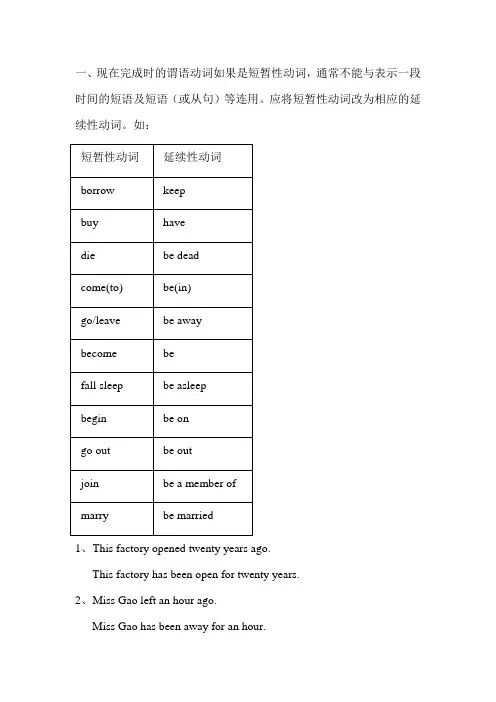
一、现在完成时的谓语动词如果是短暂性动词,通常不能与表示一段时间的短语及短语(或从句)等连用。
应将短暂性动词改为相应的延续性动词。
如:1、This factory opened twenty years ago.This factory has been open for twenty years.2、Miss Gao left an hour ago.Miss Gao has been away for an hour.3、Her teacher has been a Party member for 3 years.Her teacher joined the Party 3 years ago.4、The film began two minutes ago.The film has been on since two minutes ago.5、He bought the bike two years ago.He has had the bike for two years.6、The old man died ten years ago.The old man has been dead for ten years.7、He came back 3 days ago.He has been back for 3 days.8、I left my hometown 10 years ago.I have been away from my hometown for 10 years.9、They got married 13 year ago.They have been married for 13 years.10、I borrowed the book a week ago.I have kept the book for a week.How long have you kept the book?注:在否定句中,短暂性动词可以和表示一段时间的状语连用。

短暂性动词,延续性动词和现在完成时短暂性动词是指动作一旦发生就立即结束。
它不能和一段时间连用。
这类动词有:go, come, arrive, leave, begin, start, join, marry等;短暂性动词的肯定式不能与表示一段时间的for或since或how long等状语连用。
例如:His father got ill. I have received his letter.但是,不可以说:His father got ill for a week.I have received his letter for three days.在否定句中,短暂性动词可以和表示一段时间的状语连用。
例如:We haven’t heard from Jane for a long time.I suppose something must have happened to her.延续性动词是指动作发生后还可以延续一段时间或者相当长的一段时间。
如:live, work, study, learn, sleep等,延续性动词可以和表示一段的时间状语连用。
值得注意的是,表示一段时间的状语除了“for+一段时间”外,还有since+n./从句(时间点),since+时间段+ago,疑问词how long,in the past+时间段,all these+时间段,from…to(时间点)以及till/until+n./句子等等。
例如:How long _______ your brother joined the army?A. hasB. hadC. is it sinceD. was there that通过审题,答案B和D很容易被排除,但是稍不注意便会选中答案A;殊不知how long为一段时间的状语,不能与非延续性动词短语has joined连用,所以这题的正确答案是C。
另外,动词的延续性与非延续性还体现在这两种句型中:延续性动词的肯定式+till/ until 短暂性动词的否定式+till/ until请看例句:We waited until he came.I didn’t go to bed until my father came back home last night.如果短暂性动词与表示一段时间的时间状语连用,必须将短暂性动词改为延续性动词。
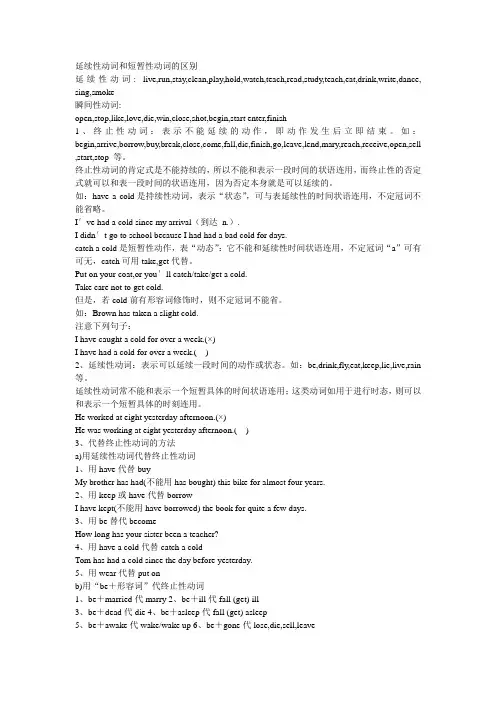
延续性动词和短暂性动词的区别延续性动词: live,run,stay,clean,play,hold,watch,teach,read,study,teach,eat,drink,write,dance, sing,smoke瞬间性动词:open,stop,like,love,die,win,close,shot,begin,start enter,finish1、终止性动词:表示不能延续的动作,即动作发生后立即结束。
如:begin,arrive,borrow,buy,break,close,come,fall,dic,finish,go,leave,lend,mary,reach,receive,open,sell ,start,stop 等。
终止性动词的肯定式是不能持续的,所以不能和表示一段时间的状语连用,而终止性的否定式就可以和表一段时间的状语连用,因为否定本身就是可以延续的。
如:have a cold是持续性动词,表示“状态”,可与表延续性的时间状语连用,不定冠词不能省略。
I′ve had a cold since my arrival(到达n.).I didn′t go to school because I had had a bad cold for days.catch a cold是短暂性动作,表“动态”:它不能和延续性时间状语连用,不定冠词“a”可有可无,catch可用take,get代替。
Put on your coat,or you′ll catch/take/get a cold.Take care not to get cold.但是,若cold前有形容词修饰时,则不定冠词不能省。
如:Brown has taken a slight cold.注意下列句子:I have caught a cold for over a week.(×)I have had a cold for over a week.()2、延续性动词:表示可以延续一段时间的动作或状态。

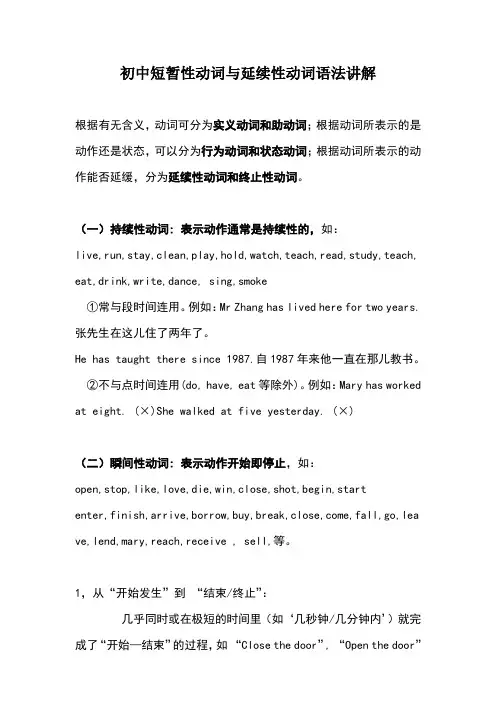
初中短暂性动词与延续性动词语法讲解根据有无含义,动词可分为实义动词和助动词;根据动词所表示的是动作还是状态,可以分为行为动词和状态动词;根据动词所表示的动作能否延缓,分为延续性动词和终止性动词。
(一)持续性动词: 表示动作通常是持续性的,如:live,run,stay,clean,play,hold,watch,teach,read,study,teach, eat,drink,write,dance, sing,smoke①常与段时间连用。
例如:Mr Zhang has lived here for two years.张先生在这儿住了两年了。
He has taught there since 1987.自1987年来他一直在那儿教书。
②不与点时间连用(do, have, eat等除外)。
例如:Mary has worked at eight. (×)She walked at five yesterday. (×)(二)瞬间性动词: 表示动作开始即停止,如:open,stop,like,love,die,win,close,shot,begin,startenter,finish,arrive,borrow,buy,break,close,come,fall,go,lea ve,lend,mary,reach,receive , sell,等。
1,从“开始发生”到“结束/终止”:几乎同时或在极短的时间里(如‘几秒钟/几分钟内’)就完成了“开始—结束”的过程,如“Close the door”, “Open the door”2,有些瞬间动词的“开始—结束的过程”可能稍微长一些,但也不会很长的,如,“buy sth(买下)”:付了款、拿了发票即完成了。
所以,“我买了这块手表5年了”,在汉语中说的通,但英语的表达就不能说:I have bought the watch for five years.buy sth ---- have sth (拥有)---have/has + had sth for…A: I have had the watch for 5 years.B: It is (has been) five years since I bought the watch. C: I bought it 5 years ago.同理,“borrow sth”“借书”在办理了相关的‘登记’手续后就结束了,不可能“借”几个星期或好几年的!汉语“这本书我已经借用了2星期了。
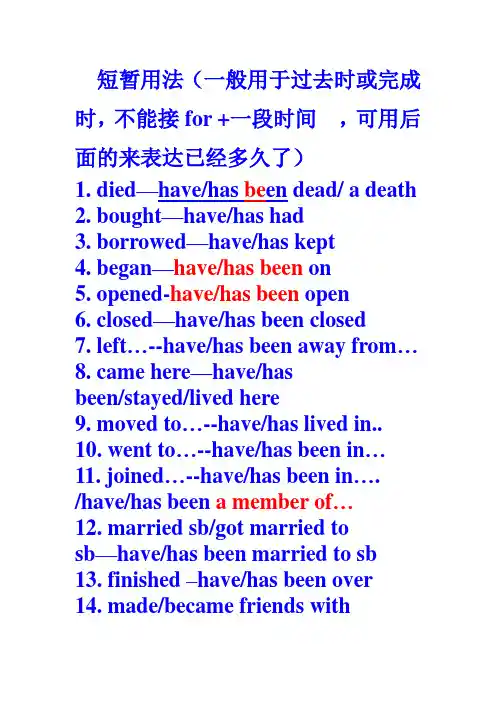
短暂用法(一般用于过去时或完成时,不能接 for +一段时间,可用后面的来表达已经多久了)1. died—have/has be en dead/ a death2. bought—have/has had3. borrowed—have/has kept4. began—have/has been on5. opened-have/has been open6. closed—have/has been closed7. left…--have/has been away from…8. came here—have/hasbeen/stayed/lived here9. moved to…--have/has lived in..10. went to…--have/has been in…11. joined…--have/has been in…./have/has been a member of…12. married sb/got married to sb—have/has been married to sb13. finished –have/has been over14. made/became friends with—have/has been friends with15. began to teach—have/has taught16. lose (lost)—haven’t/hasn’t had17.become (became)—have/has been ******************************* * He went to London in 1990. He is still in London now.→He has been in London since 1990. * I borrowed the book two weeks ago. →I have kept the book for two weeks/since two weeks ago.It is two weeks since I borrowed the book.●He joined the League two yearsago. = It is two years since hejoined the League.= He has been in the League for two years/ since two years ago.同义句(用两种方法变):1.The film began ten minutes ago. It is …since….It is ten minutes since the film began. The film has been on for ten minutes/since ten minutes ago.2.It is three days since he left.He left three days ago.He has been away from here for three days/since three days ago.3.He came here half an hour ago,and he is still here now.It is half an hour since he came here. He has been here for half an hour./since half an hour ago.4.Mary married Tom ten years ago. It is ten years since Mary married Tom.Mary has been married to Tom for ten years/since ten years ago.5.I began to teach English fourteenyears ago.It is fourteen years since I began toteach English.I have taught English for fourteen years/since fourteen years ago.I have been an English teacher for 14 years.Test in class1.He moved to Shenzhen two yearsago.It is two years since he moved to Shenzhen.He has lived in Shenzhen for two years/since two years ago.2.My father went to Shanghai lastweek.It is a week since my father went to Shanghai.My father has been in Shanghai since last week.3.Mike joined the army three yearsago.It is three years since Mike joined the army.Mike has been in the army for three years/since three years ago.4.It is ten minutes since the filmbegan.The film began ten minutes ago. The film has been on for ten minutes/since ten minutes ago.5.He bought the computer fourweeks ago.It is four weeks since he bought the computer.He has had the computer for four weeks/since four weeks ago.。
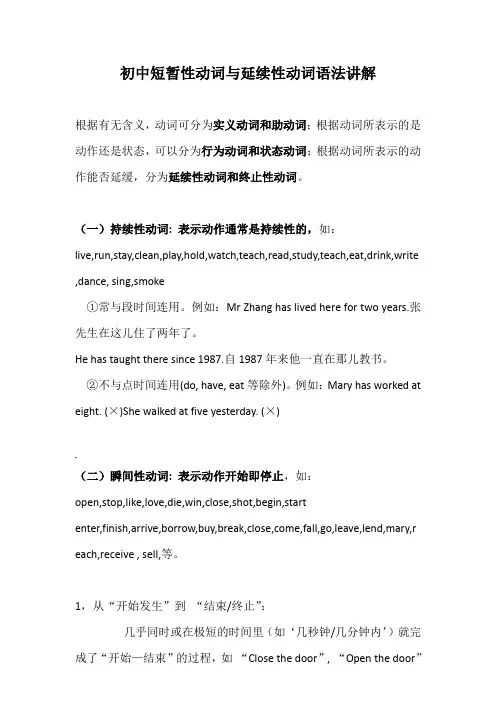
初中短暂性动词与延续性动词语法讲解根据有无含义,动词可分为实义动词和助动词;根据动词所表示的是动作还是状态,可以分为行为动词和状态动词;根据动词所表示的动作能否延缓,分为延续性动词和终止性动词。
(一)持续性动词: 表示动作通常是持续性的,如:live,run,stay,clean,play,hold,watch,teach,read,study,teach,eat,drink,write ,dance, sing,smoke①常与段时间连用。
例如:Mr Zhang has lived here for two years.张先生在这儿住了两年了。
He has taught there since 1987.自1987年来他一直在那儿教书。
②不与点时间连用(do, have, eat等除外)。
例如:Mary has worked at eight. (×)She walked at five yesterday. (×),(二)瞬间性动词: 表示动作开始即停止,如:open,stop,like,love,die,win,close,shot,begin,startenter,finish,arrive,borrow,buy,break,close,come,fall,go,leave,lend,mary,r each,receive , sell,等。
1,从“开始发生”到“结束/终止”:几乎同时或在极短的时间里(如‘几秒钟/几分钟内’)就完成了“开始—结束”的过程,如“Close the door”, “Open the door”2,有些瞬间动词的“开始—结束的过程”可能稍微长一些,但也不会很长的,如,“buy sth(买下)”:付了款、拿了发票即完成了。
所以,“我买了这块手表5年了”,在汉语中说的通,但英语的表达就不能说:I have bought the watch for five years.buy sth ---- have sth (拥有)---have/has + had sth for…A: I have had the watch for 5 years.、B: It is (has been) five years since I bought the watch.C: I bought it 5 years ago.同理,“borrow sth”“借书”在办理了相关的‘登记’手续后就结束了,不可能“借”几个星期或好几年的!汉语“这本书我已经借用了2星期了。
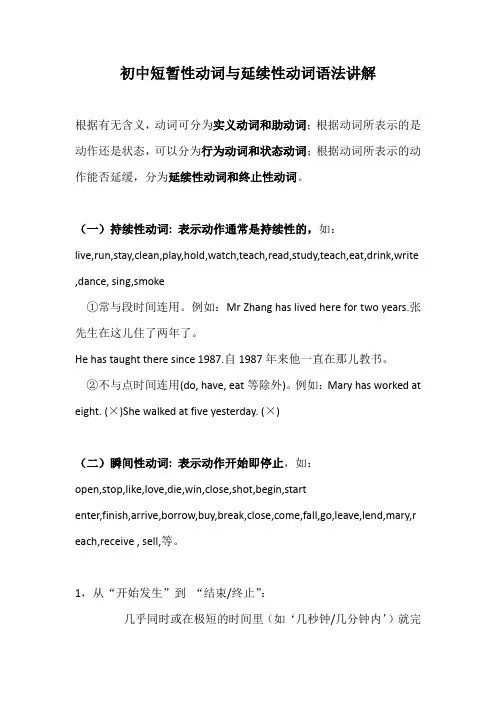
初中短暂性动词与延续性动词语法讲解根据有无含义,动词可分为实义动词和助动词;根据动词所表示的是动作还是状态,可以分为行为动词和状态动词;根据动词所表示的动作能否延缓,分为延续性动词和终止性动词。
(一)持续性动词: 表示动作通常是持续性的,如:live,run,stay,clean,play,hold,watch,teach,read,study,teach,eat,drink,write ,dance, sing,smoke①常与段时间连用。
例如:Mr Zhang has lived here for two years.张先生在这儿住了两年了。
He has taught there since 1987.自1987年来他一直在那儿教书。
②不与点时间连用(do, have, eat等除外)。
例如:Mary has worked at eight. (×)She walked at five yesterday. (×)(二)瞬间性动词: 表示动作开始即停止,如:open,stop,like,love,die,win,close,shot,begin,startenter,finish,arrive,borrow,buy,break,close,come,fall,go,leave,lend,mary,r each,receive , sell,等。
1,从“开始发生”到“结束/终止”:几乎同时或在极短的时间里(如‘几秒钟/几分钟内’)就完成了“开始—结束”的过程,如“Close the door”, “Open the door”2,有些瞬间动词的“开始—结束的过程”可能稍微长一些,但也不会很长的,如,“buy sth(买下)”:付了款、拿了发票即完成了。
所以,“我买了这块手表5年了”,在汉语中说的通,但英语的表达就不能说:I have bought the watch for five years.buy sth ---- have sth (拥有)---have/has + had sth for…A: I have had the watch for 5 years.B: It is (has been) five years since I bought the watch.C: I bought it 5 years ago.同理,“borrow sth”“借书”在办理了相关的‘登记’手续后就结束了,不可能“借”几个星期或好几年的!汉语“这本书我已经借用了2星期了。
过去进行时之常见短暂性动词和延续性动词汇总
is/was+时间段n.+since(自从...已经多久了)
注意这个句型的以下几个方面(时态搭配和区分v.是连续的v.还是暂时的v.)
1.itis+时间段n.+sincesb.havedone(该v.必须为延续性v.,翻译时直译:自从...已经多久了)
从那以后有多久了
如为延续性v.翻译时反译:自从...不已经多久了)
我在这里住了五年。
我已经五年没有住在这里了
itis5yearssinceilivedhere.(live为延续性v.故反译为我已经5年不住这儿了。
)
三年前就结束了。
我已经三年没抽烟了
itis3dayssincetheaccidenthappened.(happen为短暂性v.故直译为自从这场车祸
发生已经有3天了。
)
他们结婚已经10年了。
他们结婚已经十年了
过去进行时之常见短暂性动词和延续性动词汇总结。
延续性动词与短暂性动词动词按其动作发生的方式、发生过程的长短可分为延续性动词与短暂性动词。
延续性动词可以与以since, for , how long等引导的表示一段时间的状语连用。
例如:He has lived here for 6 years.How long did you stay there last year?短暂性动词也称终止性动词、非延续性动词或瞬间动词,表示不能延续的动作,这种动作发生后立即结束.如:open ,die ,close ,begin ,finish ,come ,go,join ,borrow ,lend ,buy ,arrive , reach ,start ,marry ,end等。
短暂性动词用在现在完成时要注意下面三点:1.短暂性动词可与just, yet, already , ever, never等连用, 用于现在完成时。
例如: The old man hasjust died.2.短暂性动词的肯定形式是不能持续的,所以不能和以since,for ,how long等引导的表示一段时间的状语连用。
例如:The old man has die d for two weeks。
(错误)How long have you borrowed the book? ( 错误)在以上两句中, die和borrow都是短暂性动词, 可用于现在完成时, 但在肯定句中不能与以since或for引导的表示一段时间的状语连用。
因此是错误的。
3.短暂性动词的否定式可以和表一段时间的状语连用,因为否定本身就是可以延续的。
例如: He hasn't left here since 1986.三.短暂性动词如果用于表示一段时间的现在完成时肯定句中, 需要作相应的变化。
现将常见的短暂性动词的转化归纳如下。
1.用相应的延续性动词替换短暂性动词。
buy → have borrow → keep put on →wear become →be catch a cold → have a cold come to work→ work begin to teach → teachget to know→ know make friends→be friends fall ill→ be ill1).buy →have (买)I bought the bike three weeks ago.I have had the bike for three weeks.I have had the bike since three weeks ago.It is three weeks since I bought the bike.Three weeks has passed since I bought the bike.2.用be+形容词或副词替换短暂性动词。
常用的短暂性动词与延续性动词的转换(1)找短暂性动词相应的延续性动词buy---have borrow---keep begin/start to do--- docatch a cold---have a cold(2)找短暂性动词相应的形容词get up---be up put on---be on open(v.)---be open(adj.)close---be not open fall ill---be illlose---be missing come back---be backleave---be away fromcome to/arrive at(in)/reach/get to---be here/there(3)找短暂性动词相应的介词短语go to town---be in town join---be in /be a member短暂性动词与延续性动词的转换具体如下:短暂动词延续动词1. borrow keephave kept2. get to know know have known3. catch a cold have a cold have had a cold4. buy havehave had5. die be deadhave been dead6. open be openhave been open7. close be closedhave been closed8. get married be marriedhave been married9. fall ill be illhave been ill10. fall asleep be asleephave been asleep11. leave sp. Be away from sp.Have been away from sp.12. return be backhave been back13. go to bed be in bedhave been in bed14. come to the island be on the island have been on the island15. go to sp./come to. Be in.Have been in16. come here be herehave been here17. go there be therehave been there18. go out be outhave been out19. get up be uphave been up20. start/ begin be onhave been on21. finish/ end be overhave been over22. become behave been23. join be a member ofhave been a member ofBe inhave been in延续性动词与非延续性动词及其转换一、动词按其动作发生的方式、发生过程的长短可分为延续性动词与非延续性动词。
一、现在完成时的谓语动词如果是短暂性动词,通常不能与表示一段时间的短语及短语(或从句)等连用。
应将短暂性动词改为相应的延续性动词。
如:
1、This factory opened twenty years ago.
This factory has been open for twenty years.
2、Miss Gao left an hour ago.
Miss Gao has been away for an hour.
3、Her teacher has been a Party member for 3 years.
Her teacher joined the Party 3 years ago.
4、The film began two minutes ago.
The film has been on since two minutes ago.
5、He bought the bike two years ago.
He has had the bike for two years.
6、The old man died ten years ago.
The old man has been dead for ten years.
7、He came back 3 days ago.
He has been back for 3 days.
8、I left my hometown 10 years ago.
I have been away from my hometown for 10 years.
9、They got married 13 year ago.
They have been married for 13 years.
10、I borrowed the book a week ago.
I have kept the book for a week.
How long have you kept the book?
注:在否定句中,短暂性动词可以和表示一段时间的状语连用。
I haven’t borrowed the book for a long time.
我好长时间没有借过这一本书了。